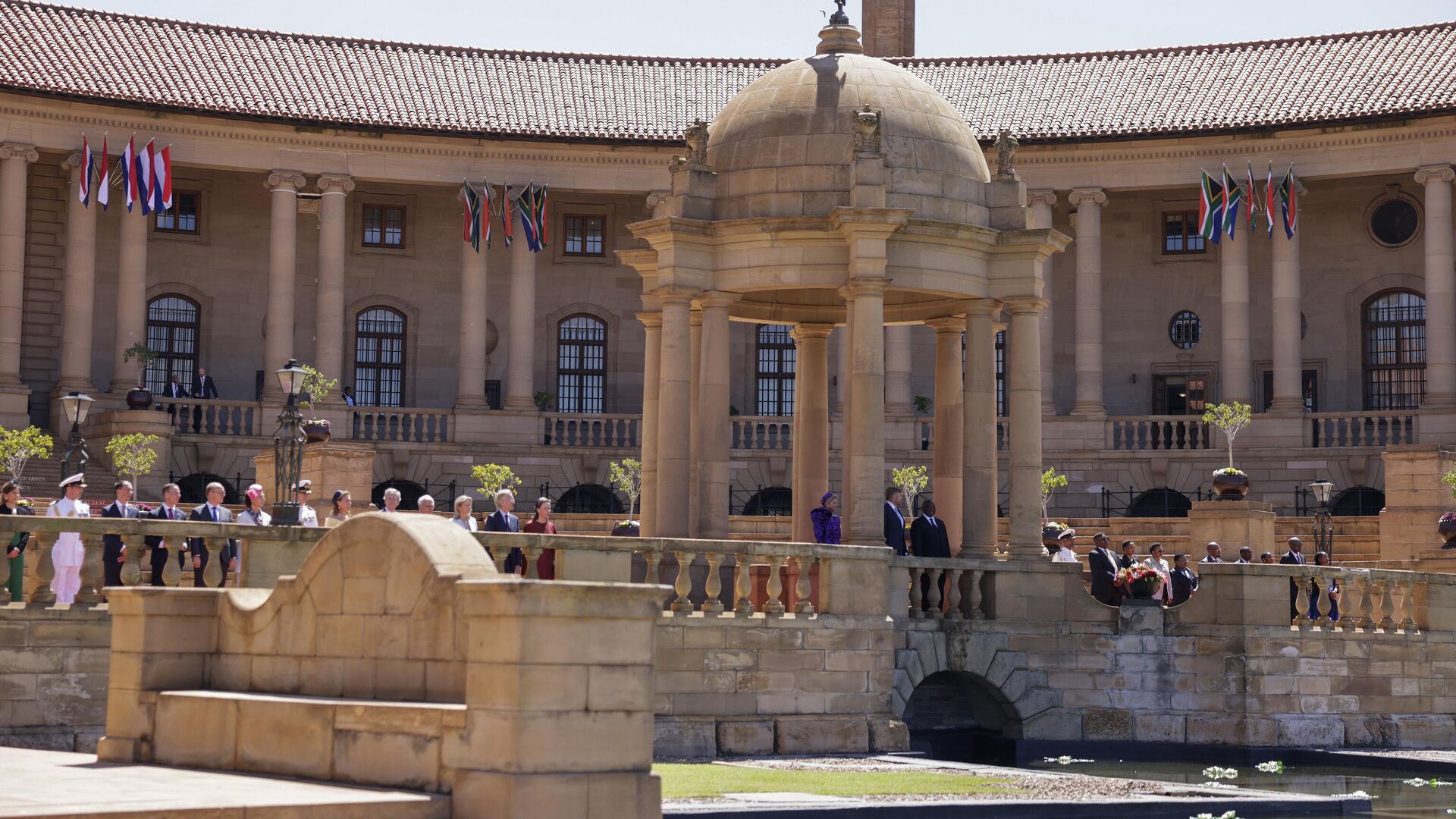https://en.sputniknews.africa/20231020/angry-protesters-meet-dutch-royal-couple-during-visit-to-south-africa-1062945216.html
Angry Protesters Meet Dutch Royal Couple During Visit to South Africa
Angry Protesters Meet Dutch Royal Couple During Visit to South Africa
Sputnik Africa
In July, Dutch King Willem-Alexander issued a historic royal apology for the Netherlands' involvement in slavery, saying he felt "personally and intensely"... 20.10.2023, Sputnik Africa
2023-10-20T15:34+0200
2023-10-20T15:34+0200
2023-10-20T15:35+0200
sub-saharan africa
cyril ramaphosa
netherlands
south africa
cape town
southern africa
neocolonialism
colonialism
https://cdn1.img.sputniknews.africa/img/07e7/0a/14/1062945844_0:320:3072:2048_1920x0_80_0_0_15c7702bc8313bdbcb3ebe8cbe355668.jpg
A group of angry protesters surrounded King Willem-Alexander of the Netherlands and his wife, Queen Maxima, when the couple visited the Iziko Slave Lodge museum in Cape Town, which is dedicated to the history of slavery, as part of a state visit to South Africa, on Friday.According to media, the royal couple had to quickly get to their car as an angry crowd of demonstrators was waiting for them. Security guards had to intervene and push back the protesters so that the royal couple could pass through the crowd. King Willem-Alexander and Queen Maxima of the Netherlands are on a state visit to South Africa on October 18-20 at the invitation of President Cyril Ramaphosa.It is noted that at the beginning of their visit to the museum, the royal couple talked with demonstrators near the building, of which there were only a few people, and the atmosphere was friendly.They wondered when the royal family would follow up the apology for the Netherlands' slave-owning past with concrete measures. However, later, when Willem-Alexander and Maxima entered the museum, the crowd around the building grew to a hundred people. Among the demonstrators were the Khoisan, the indigenous people of South Africa. They demanded real action from the King of the Netherlands beyond his previous apology.Protesters came to the museum with signs that read: "You are stealing our culture," "We were first," "We want compensation," and "You are forgetting about us." In December 2022, Prime Minister of the Netherlands Mark Rutte apologized for the country's role in slavery, and in July this year an apology followed from King Willem-Alexander of the Netherlands.In recent years, the Netherlands has been in debate about its colonial and slave trading past that turned it into one of the world's richest countries. Dutch royals have found themselves at the center of this debate.The Netherlands were a significant colonial power in the 16th-20th centuries. In the Dutch colonies, slavery was abolished on July 1, 1863. The Dutch funded their "Golden Age" of empire and culture in the 16th and 17th centuries by shipping around 600,000 Africans as part of the slave trade, mostly to South America and the Caribbean, including Aruba, Curacao, Sint Maarten, as well as the Caribbean Netherlands: the islands of Bonaire, Sint Eustatius and Saba.
netherlands
south africa
cape town
southern africa
Sputnik Africa
feedback@sputniknews.com
+74956456601
MIA „Rossiya Segodnya“
2023
Samantha Arias
https://cdn1.img.sputniknews.africa/img/07e7/0a/18/1063050346_115:0:834:719_100x100_80_0_0_1682778780537fd5aa8dd2536a012c1b.jpg
Samantha Arias
https://cdn1.img.sputniknews.africa/img/07e7/0a/18/1063050346_115:0:834:719_100x100_80_0_0_1682778780537fd5aa8dd2536a012c1b.jpg
News
en_EN
Sputnik Africa
feedback@sputniknews.com
+74956456601
MIA „Rossiya Segodnya“
Sputnik Africa
feedback@sputniknews.com
+74956456601
MIA „Rossiya Segodnya“
Samantha Arias
https://cdn1.img.sputniknews.africa/img/07e7/0a/18/1063050346_115:0:834:719_100x100_80_0_0_1682778780537fd5aa8dd2536a012c1b.jpg
cyril ramaphosa, netherlands, south africa, cape town, southern africa, neocolonialism, colonialism
cyril ramaphosa, netherlands, south africa, cape town, southern africa, neocolonialism, colonialism
Angry Protesters Meet Dutch Royal Couple During Visit to South Africa
15:34 20.10.2023 (Updated: 15:35 20.10.2023) Samantha Arias
Producer / Podcast host
In July, Dutch King Willem-Alexander issued a historic royal apology for the Netherlands' involvement in slavery, saying he felt "personally and intensely" affected. His speech before thousands of descendants of slaves got a positive reception, but others have insisted that the Netherlands should to pay a compensation.
A group of angry protesters surrounded King Willem-Alexander of the Netherlands and his wife, Queen Maxima, when the couple visited the Iziko Slave Lodge museum in Cape Town, which is dedicated to the history of slavery, as part of a state visit to South Africa, on Friday.
According to media, the royal couple had to quickly get to their car as an angry crowd of demonstrators was waiting for them. Security guards had to intervene and push back the protesters so that the royal couple could pass through the crowd.
King Willem-Alexander and Queen Maxima of the Netherlands are on a state visit to South Africa on October 18-20 at the invitation of President Cyril Ramaphosa.
It is noted that at the beginning of their visit to the museum, the royal couple talked with demonstrators near the building, of which there were only a few people, and the atmosphere was friendly.
They wondered when the royal family would follow up the apology for the Netherlands' slave-owning past with concrete measures. However, later, when Willem-Alexander and Maxima entered the museum, the crowd around the building grew to a hundred people. Among the demonstrators were the Khoisan, the indigenous people of South Africa. They demanded real action from the King of the Netherlands beyond his previous apology.
Protesters came to the museum with signs that read: "You are stealing our culture," "We were first," "We want
compensation," and "You are forgetting about us." In December 2022, Prime Minister of the Netherlands Mark Rutte apologized for the country's role in slavery, and in July this year an apology followed from King Willem-Alexander of the Netherlands.
In recent years, the Netherlands has been in debate about its colonial and
slave trading past that turned it into one of the world's richest countries. Dutch royals have found themselves at the center of this debate.
The Netherlands were a significant colonial power in the 16th-20th centuries. In the Dutch colonies, slavery was abolished on July 1, 1863. The Dutch funded their "Golden Age" of empire and culture in the 16th and 17th centuries by shipping around 600,000 Africans as part of the slave trade, mostly to South America and the Caribbean, including Aruba, Curacao, Sint Maarten, as well as the Caribbean Netherlands: the islands of Bonaire, Sint Eustatius and Saba.


